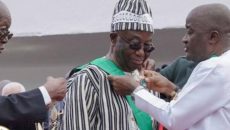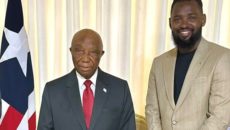PAYNESVILLE, Montserrado – With 75 percent of Liberians being 35 years old and younger, youth employment is extremely vital to the stability of the nation.
However, despite this fact, many Liberian youths remain unemployed and those employed are primarily considered vulnerably employed, meaning they are self-employed mostly in the informal economy on unsustainable jobs, with little to no benefits, unassured salary and pension, or work for a family member without pay.
It is this problem of youth unemployment that the World Bank has decided to tackle with a US$10 million Youth Opportunity Project.
The project seeks to provide job opportunities for 15,000 youth between ages 15 and 35 across the 15 counties through December 2020. According to a press release issued, YOP’s financing will also provide support for strengthening the government’s capacity to implement its Social Cash Transfer program.
A pre-employment social support component will target youth under 18 and it will provide job-readiness training to prepare 2,000 youths to participate in the labor market. For the older participants, a group of about 3,000 individuals will be provided skills training opportunities and support for small businesses. Both components will be implemented in urban areas of Montserrado.
Another component of the project will provide life skills training and support for community farm production to 10,000 youths and plans to enhance the productivity of staple crops using high-quality inputs, as well as support for agro-processing. This component will be implemented in rural areas of all 15 counties in Liberia. The activities will be implemented in close cooperation with the private sector.
Vice President Joseph Boakai launched the project on Jan. 9 on behalf of President Ellen Johnson Sirleaf.
Young Liberians have expressed eagerness in benefitting from the program. George Montgomery, a youth in Monrovia, said the program would reduce vulnerability of young people.
“If we the youth can have something to do, we will be seen as assets to our communities and country,†Montgomery said.
He believes most youths are perceived as unproductive because they lack the opportunity to be independent.
A youth leader in Paynesville, Harleyson Joe, praised the government and the financier of the program for the move to give young people more opportunities.
Joe said the move would help reduce the high number of young drug users, noting, “Too many of our young are languishing in the streets doing nothing.â€
Meanwhile, Boakai said that the need to advance the situation of Liberian youth is overwhelming. He said that by building on lessons from previous interventions, YOP is designed as part of the government’s economic transformation agenda. “Its launch today is intended to send a strong signal and message to the Liberian people about the government’s determination to empower the youth of our country,†Boakai said.
“This, in earnest, manifests our call to duty and a sacred social contract with our people, which we must execute,†he added.
Consistent with the New Agricultural Transformation Agenda, Boakai said the agriculture subcomponent of YOP is a part of the administration’s deliberate strategy.
“This strategy is aimed at redirecting most of our youth who are gravitating toward the comforts and bright lights of our cities, and leaving the rural areas, where opportunities in the agriculture sector are in abundance,†he added. “Concentrating a significant proportion of the project in the rural areas of the counties should derive the benefit of encouraging these Liberian youth to remain, or return to the rural areas and choose agriculture as a path to sustainable economic growth and empowerment.â€
Anita Kollie, a young street trader in Paynesville, says she is anticipating the implementation of the program. Kollie added that she relocated from Lofa to Paynesville for better opportunities. “If there will be a program to help us in our own counties, I personally will want to go back home,†she said.
She expressed delight for the launch of the program and praised the government’s partners and members of the legislature for their contribution to the country’s development.
The World Bank’s YOP task team leader Suleiman Namara said the team recognizes that rural and urban youth have different employment constraints and therefore the project is designed to address specific needs of different cohorts of youth, with a focus on pre-employment and life skills activities to strengthen youth participation in the labor market.
“The project emphasizes corruption prevention and grievance redress mechanisms,†Namara said. “The project will, therefore, engage independent anti-corruption institutions in a third-party monitoring of project implementations and benchmarksâ€.
The YOP will be implemented by the Ministry of Youth and Sports, which will bear the overall responsibility for ensuring the effective implementation of this project.



